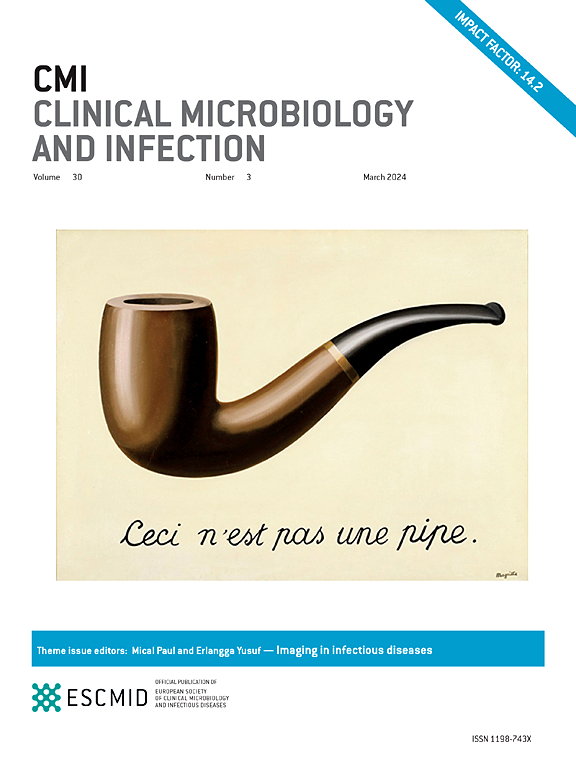Comparative efficacy and safety of treatment regimens for Pneumocystis jirovecii pneumonia in people living with HIV: a systematic review and network meta-analysis of randomized controlled trials
IF 8.5
1区 医学
Q1 INFECTIOUS DISEASES
引用次数: 0
Abstract
Background
Pneumocystis jirovecii pneumonia (PCP) is a serious opportunistic infection in people living with HIV (PWH) who have low CD4 counts. Despite its side effects, trimethoprim–sulfamethoxazole (TMP-SMX) is currently considered the primary treatment for PCP.
Objectives
The objectives of this study are to compare the efficacy (treatment failure and mortality) and tolerability (treatment change) of PCP treatment regimens with a frequentist network meta-analysis.
Data sources
Data sources include Embase, Medline, and CENTRAL from inception to 3 February 2024.
Study eligibility criteria
Study eligibility criteria include comparative randomized controlled trials (RCTs) of at least two PCP treatment regimens.
Participants
Participants include PWH.
Interventions
Interventions include treatment regimens for PCP compared head-to-head.
Assessment of risk of bias
Assessment of risk of bias includes Cochrane Risk-of-bias tool for RCTs (Cochrane Risk-of-Bias 2).
Methods of data synthesis
Title, abstract, and full-text screening, along with data extraction, were conducted by two independent reviewers. Data on PCP treatment failure, all-cause mortality, and discontinuation because of toxicity were pooled and ranked.
Results
Fourteen RCTs conducted between 1983 and 1996 included 1788 participants across 27 treatment arms. No regimen showed statistically significant superiority over TMP-SMX in direct comparison. In the network meta-analysis, clindamycin/primaquine was ranked the best (surface under the cumulative ranking curve, 0.8), followed by intravenous pentamidine (0.8) and TMP-SMX (0.8) regarding treatment failure. Regarding all-cause mortality, TMP-SMX was superior to atovaquone in direct comparison, but no treatment was superior in the full network analysis. Dapsone–TMP (0.7) and intravenous pentamidine (0.8) were ranked the highest for mortality reduction. For safety and tolerability, comparator drugs consistently outperformed TMP-SMX, with significant reductions in toxicity observed for dapsone–TMP, inhaled pentamidine, and atovaquone. Inhaled pentamidine (0.9) was the best tolerated, followed by trimetrexate (0.8) and atovaquone (0.8).
Conclusions
We conclude that TMP-SMX should be reassessed as the standalone first-line therapy for PCP in PWH, given the better tolerability and comparable efficacy of other treatments. In places with access to alternative drugs for PCP treatment, our analysis suggests that alternative regimens may offer comparable effectiveness, providing flexibility to use alternative treatments when comorbidities necessitate it.

HIV感染者肺炎治疗方案的比较疗效和安全性——随机对照试验的系统评价和网络荟萃分析
背景:吉氏肺囊虫肺炎(PCP)是CD4计数低的HIV感染者(PWH)的一种严重的机会性感染。尽管有副作用,甲氧苄啶-磺胺甲恶唑(TMP-SMX)目前被认为是PCP的主要治疗方法。目的:通过频率网络meta分析(NMA)比较PCP治疗方案的疗效(治疗失败和死亡率)和耐受性(治疗改变)。数据来源:Embase, MEDLINE和CENTRAL从成立到2024年2月3日。研究资格标准:至少两种PCP治疗方案的比较随机对照试验(rct)。参与者:PWH。干预措施:对PCP的治疗方案进行头对头比较。偏倚风险评估:Cochrane随机对照试验偏倚风险评估工具(RoB2)数据综合:标题、摘要和全文筛选,以及数据提取,由两名独立审稿人进行。对PCP治疗失败、全因死亡率和因毒性而停药的数据进行汇总和排序。结果:1983年至1996年间进行的14项随机对照试验包括27个治疗组的1788名参与者。在直接比较中,没有方案比TMP-SMX有统计学上的显著优势。在网络荟萃分析中,克林霉素/伯氨喹在治疗失败方面排名最高(累积排名曲线下的表面,0.8),其次是IV喷他脒(0.8)和TMP-SMX(0.8)。在全因死亡率方面,TMP-SMX在直接比较中优于阿托伐酮,但在全网络分析中没有任何治疗优于阿托伐酮。氨苯砜- tmp(0.7)和IV喷他脒(0.8)在降低死亡率方面排名最高。在安全性和耐受性方面,比较药物一直优于TMP-SMX,观察到氨苯砜- tmp、吸入喷他脒和阿托伐酮的毒性显著降低。吸入喷他脒(0.9)耐受性最佳,其次是三甲氨蝶呤(0.8)和阿托伐酮(0.8)。结论:我们得出结论,考虑到其他治疗方法更好的耐受性和相当的疗效,TMP-SMX应该被重新评估为PWH PCP的独立一线治疗方法。在有替代药物治疗PCP的地方,我们的分析表明,替代方案可能提供相当的效果,当合并症需要时,可以灵活地使用替代治疗。
本文章由计算机程序翻译,如有差异,请以英文原文为准。
求助全文
约1分钟内获得全文
求助全文
来源期刊
CiteScore
25.30
自引率
2.10%
发文量
441
审稿时长
2-4 weeks
期刊介绍:
Clinical Microbiology and Infection (CMI) is a monthly journal published by the European Society of Clinical Microbiology and Infectious Diseases. It focuses on peer-reviewed papers covering basic and applied research in microbiology, infectious diseases, virology, parasitology, immunology, and epidemiology as they relate to therapy and diagnostics.

 求助内容:
求助内容: 应助结果提醒方式:
应助结果提醒方式:


